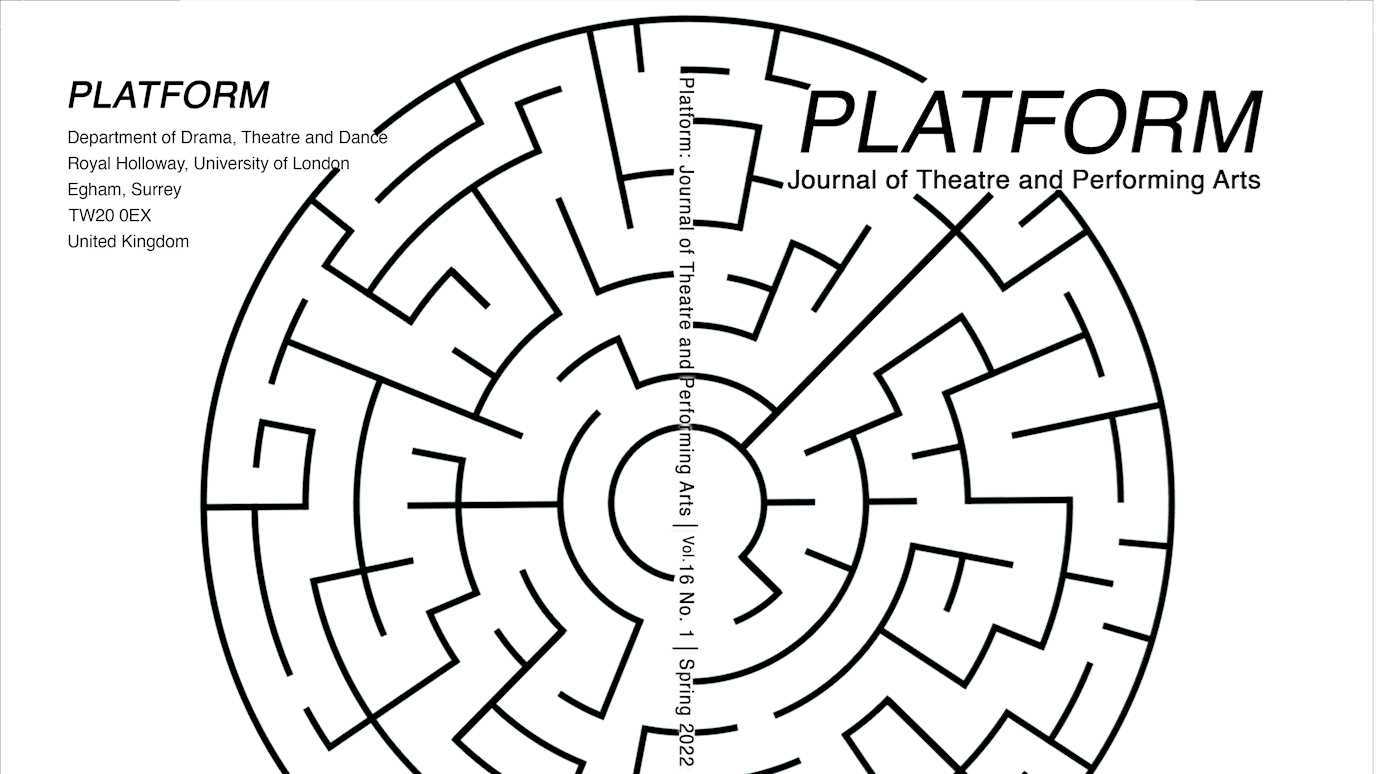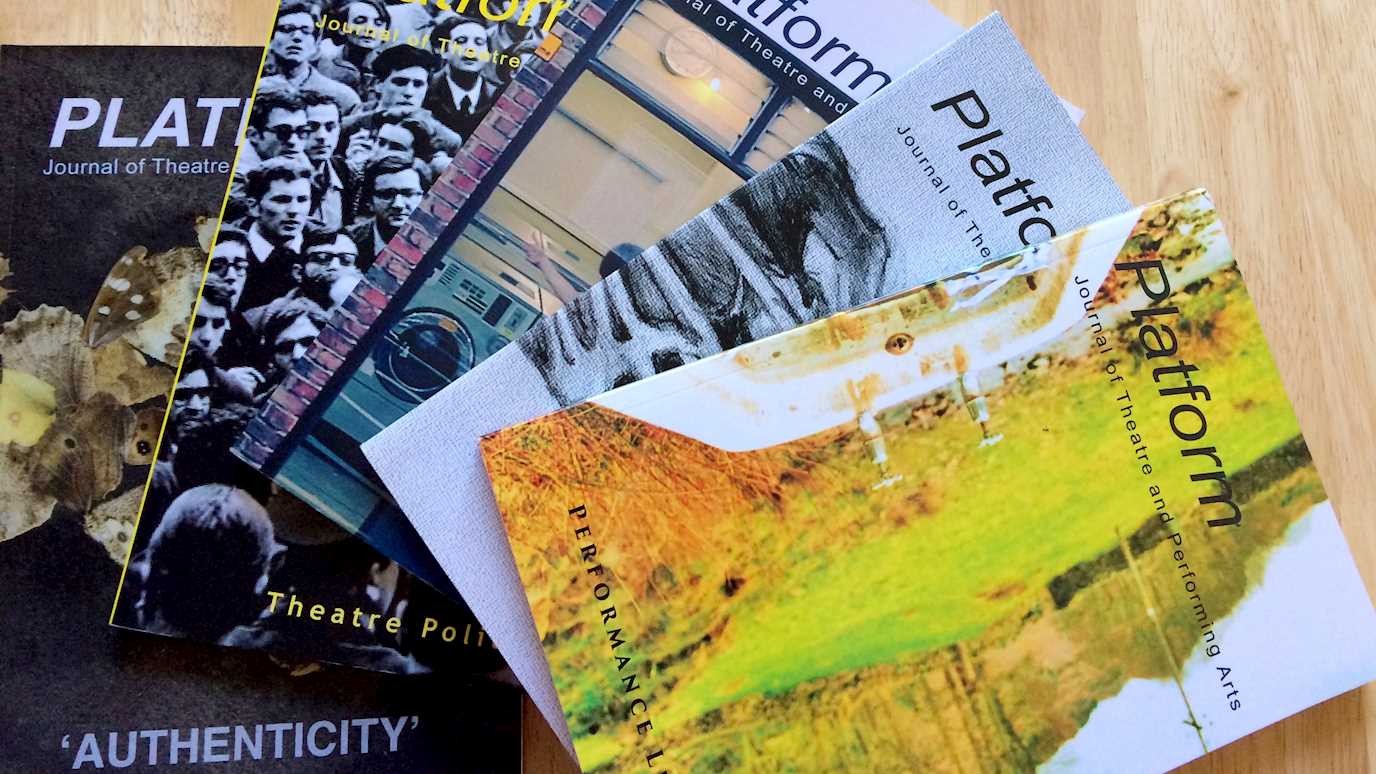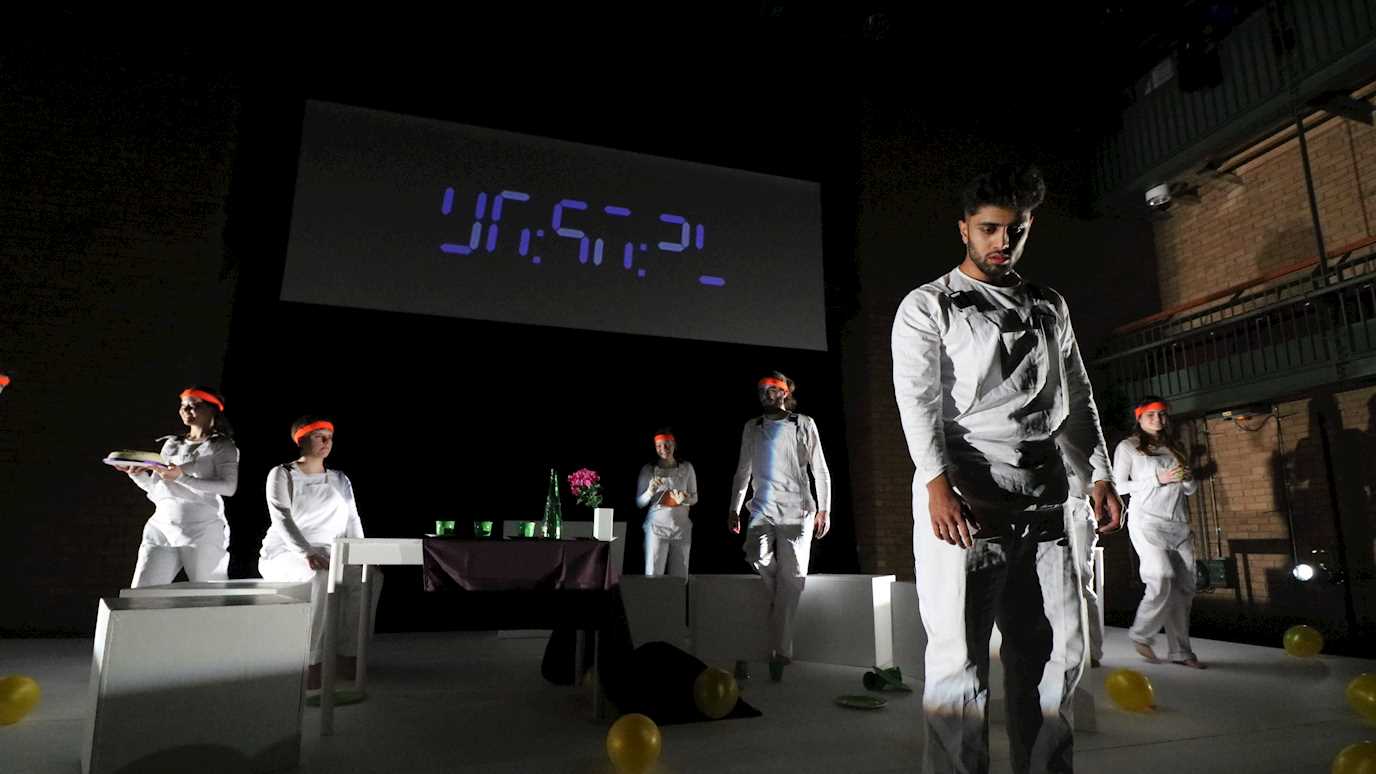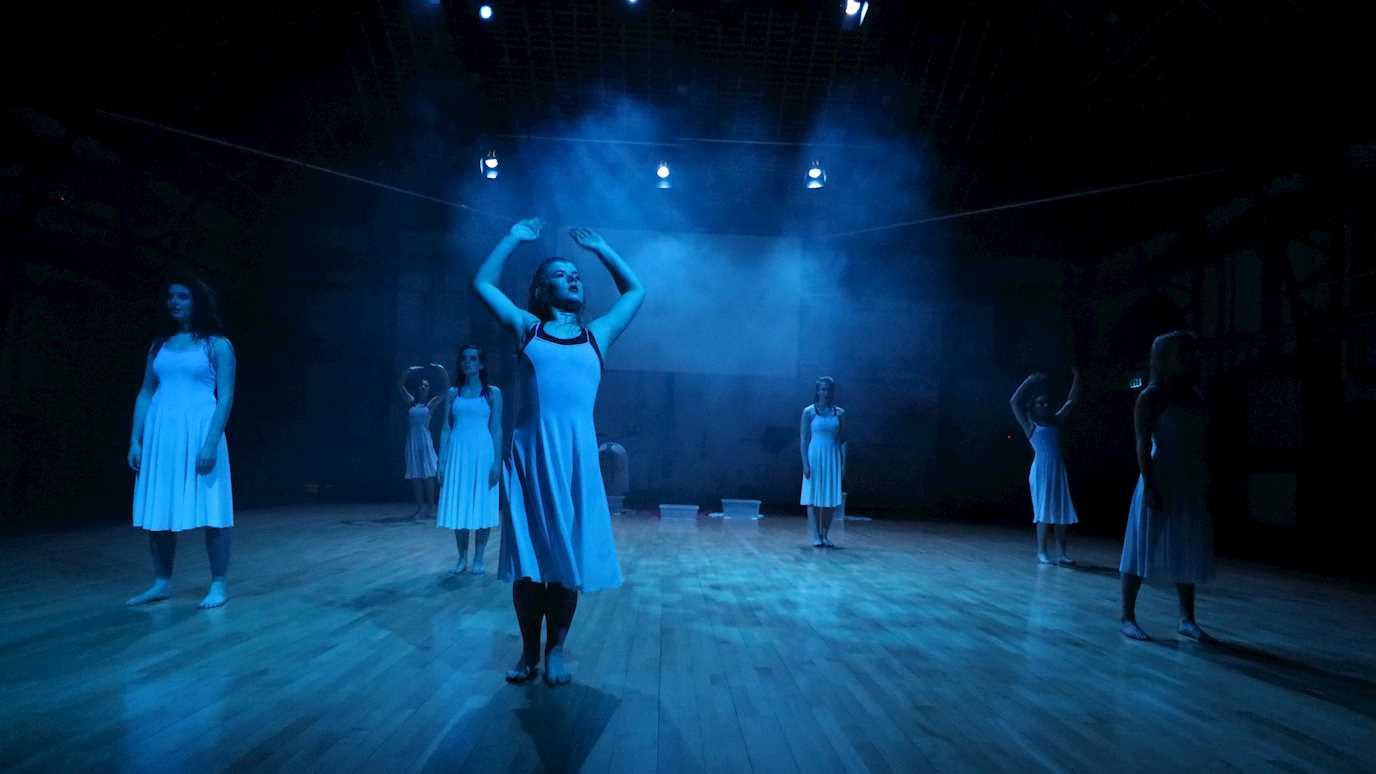We are currently accepting proposals for the next issue of Platform: volume 17, issue 2, Gatherings, co-edited by Milo Harries (University of Cambridge) and Grace Joseph (Goldsmiths, University of London).
The deadline for proposals is 23:59 on Monday 31st July, 2023.
Proposals should be submitted to platform-submissions@rhul.ac.uk.
Call for Papers: Platform 17:2, Gatherings (Summer 2024)
The page and the auditorium (or their equivalent) might then be thought of as places where writers and readers and performers and audience members meet, not in order to think the same thoughts or to see and hear the same things, nor in order for change to occur (though – importantly – it might, and often will), but in order to explore the act of gathering itself. (Shah, 49)
This issue of Platform takes interest in how gatherings are formed, on and off page and stage. For Gareth White, division is a core part of the initiation of the aesthetic: ‘[a] social occasion’, White writes, ‘becomes a theatre performance partly through the separation of performers from audiences’ (7). Accordingly, in this issue we call attention to distinctions, seeing distance and difference as potential foundations for encounter, identity, and solidarity. This issue holds space, with Rajni Shah, as with Sara Ahmed, for reflections on the formal politics of encounters in general, and theatre encounters in particular. We are curious about conventions of orientation, and habits and customs of arrival, asking: how do people meet, in theatres, and in discussions about theatre? Who is allowed access, and how are some denied it? When does a performance’s political work begin? Who gets to attend at all? How are people made to meet and held apart from meeting? By whom? On whose terms? For whose ends?
This issue thus engages with theatre as both an expression of and experiment in what Doreen Massey calls ‘the social in the widest sense’: ‘the challenge of our constitutive interrelatedness [...] and the ongoing and ever-specific project of the practices through which that sociability is to be configured’ (195). By extension, we’re also interested in how the relationships between writers, editors, and readers will be structured in this issue, following Petra Kuppers’ play with I/you/we pronouns as ‘a deliberate invitation – not to overidentify but to wonder’ (1); Olúfẹ́mi O. Táíwò’s provocation, ‘[h]ow did you and I get to be here, interacting across this page?’ (76); and Salomé Voegelin’s endeavour to ‘find my voice in reading yours aloud’ (xi). As such, we are considering textual, visual, and auditory formats, and invite contributions which engage with the first- and second-person encounter in content and in form. Across these formats, and in addition to the questions above, respondents are invited to consider, especially in light of their intersections with questions of disability, class, gender, sexuality, and race:
- Gatekeeping, prestige, and exclusivity in relation to theatre and theatres
- Behaviour policing, ‘reasonableness’ and disruption (Sedgman)
- Stage-door culture, celebrity casting, and fandom
- Relationships between ideas of artistic ‘quality’ and the provision of access
- Funding, programming, and competing principles of access
- The pragmatics and aesthetics of theatre architecture
- ‘Nonperformative’ commitments to access (Ahmed, ‘Declarations’)
- Relaxed venues and performances
- (Re)imaginations of the academy
- Accessible or embodied pedagogy
- Relationships between text, voice, and sign language
- Theatre’s relationship to other spaces of collective pleasure and group identity (e.g. football matches, religious ceremonies, and gigs)
- Hybrid formats (e.g. for conferences, festivals, and shows)
We are eager for submissions across a range of scales and frames: proposals might, for instance, consider individual works; institutional commitments (e.g. Battersea Arts Centre's configuration as a relaxed venue, or Slung Low's lockdown reinvention as a food bank and community support centre); or dramaturgical explorations of accessible, ‘immersive’ and non-normatively-participatory forms.
We are inviting abstracts of 300 words, to be submitted to platform-submissions@rhul.ac.uk by 23:59 on Monday 31st July, 2023. Please also include a short biographical note. In the past, Platform has most frequently published academic essays of approximately 4,000 words. All of the pieces for this issue, however, will be produced in audio and text formats, with the ambition of collectively representing neither a ‘text-first’ nor an ‘audio-first’ collection. We are therefore keen to receive proposals that think creatively about this dual format, and are open to abstracts that reflect the proposed work in whichever manner you feel is most suitable; this includes, but is not limited to, conventional essays. As such, we welcome (for example) visual contributions, and encourage the inclusion of image or audio descriptions. We will also gladly collaborate on descriptions after submission, if preferred. Should your abstract be accepted, the deadline for first drafts will be Monday 9th October, 2023.
Please send any enquiries to Grace (gjose003@gold.ac.uk) and Milo (meh57@cam.ac.uk).
References
Ahmed, Sara. ‘Declarations of Whiteness: The Non-Performativity of Anti-Racism’. borderlands 3:2, 2004.
Ahmed, Sara. Queer Phenomenology: Orientations, Objects, Others. Duke University Press, 2006.
Ahmed, Sara. Strange Encounters: Embodied Others in Post-Coloniality. Routledge, 2000.
Kuppers, Petra. Eco Soma: Pain and Joy in Speculative Performance Encounters. University of Minnesota Press, 2021.
Massey, Doreen B. For Space. SAGE, 2005.
Sedgman, Kirsty. The Reasonable Audience: Theatre Etiquette, Behaviour Policing, and the Live Performance Experience. Palgrave Macmillan, 2018.
Shah, Rajni. Experiments in Listening. Rowman & Littlefield, 2021.
Táíwò, Olúfẹ́mi O. Elite Capture: How the Powerful Took Over Identity Politics (And Everything Else). Pluto Press, 2022.
Voegelin, Salomé. Uncurating Sound: Knowledge with Voice and Hands. Bloomsbury Academic, 2023.
White, Gareth. Audience Participation in Theatre: Aesthetics of the Invitation. Palgrave Macmillan, 2013.
Submissions Guide
Who may submit?
Contributions are particularly welcome from postgraduate researchers, postdoctoral researchers, and early-career academics in theatre and performing arts.
What to submit
We welcome proposals for content in a variety of formats. These include, but are not limited to, academic papers, performance responses, photo essays, book reviews, interviews, and new dramatic writing. Platform particularly welcomes practice-based research papers. We are open to publishing alternative media and academic work. If you would like to enquire about the suitability of your submission, please contact us.
Submission guidelines
-
Proposals should include an abstract of up to 300 words, and an author's biography of no more than 50 words, along with academic affiliation.
-
If you wish to propose a performance response or book review, please keep in mind that completed reviews should be around 1,000 words.
-
Proposals should be sent electronically as email attachments to platform-submissions@royalholloway.ac.uk.
-
By submitting to Platform: Journal of Theatre and Performing Arts, you are asserting that your submission is original work, with all authors being appropriately credited, and all references appropriately cited according to MLA. You are affirming that this work has not been published elsewhere. Any potential issues in this regard must be flagged clearly to the editors in an email.
Style guide
When preparing an article for Platform, please ensure it conforms to the following journal styles:
- Articles submitted should be in Word document format.
- Since the journal uses the double-blind review process, articles submitted should not contain the name(s) of the author(s). Please ensure that all identifying information has been removed so that we can send your article out to be reviewed anonymously.
- Please use the MLA citation system. For further details about the MLA style guidelines please consult the sixth or subsequent edition of the MLA Handbook for Writers of Research Papers. Should a copy not be available, please consult the following short and alternative sources: Departmental style guide (helpful for basic MLA) and Diana Hacker’s style guide (Helpful for more difficult referencing problems).
- The list of Works Cited should have hanging indents.
- Platform uses the serial comma (also known as the Oxford comma).
- Quotes should be in single inverted commas (rather than double quotation marks). Quotes within quotes should be in double quotation marks.
- When a source is written by more than two authors, name only the first author and follow this with ‘et al.’
- The format for dates mentioned in text or in citations is the following: 29 November 2017.
- Articles can be written in either British or American English, but should be consistent in their usage.
- Line spacing for articles is 1.5 lines.
- For the grammatical dash, please use the em-dash (not the en-dash or hyphen), without spaces before and after the dash.
- If your article contains any images, then all images should be captioned with a figure number, image title, the place where the image was taken and who the image is courtesy of. Images should normally be in jpeg format. Authors must also ensure that they have the right to publish the image(s). If your article is accepted for publication, you will be asked to provide them in high resolution for the printed version of the journal.
























